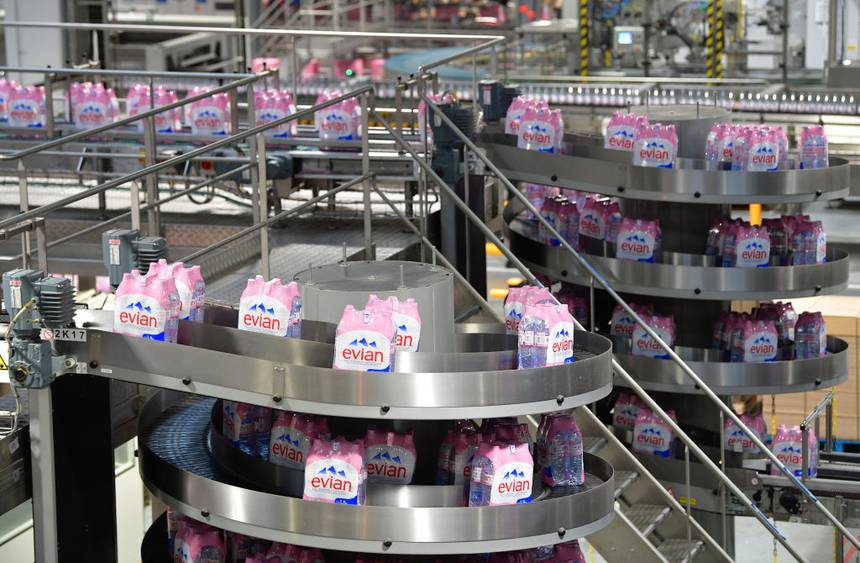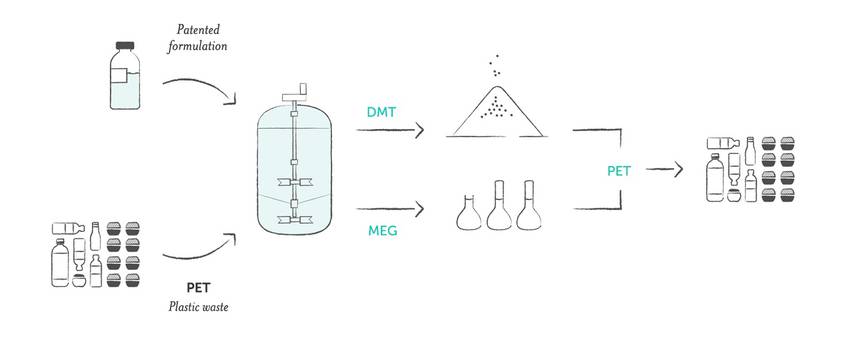They are facing a consumer backlash and more regulation, so they are trying to change the discussion.
Plastic water bottles are a scourge that we have been writing about since TreeHugger started. As Elizabeth Royte noted in her book Bottlemania, it was all part of a plot to get us hooked and convince us that recycling made it all fine.
…as one Pepsico marketing VP said to investors in 2000, “When we are done, tap water will be relegated to showers and washing dishes.” And don’t call those bottles garbage; Coke’s “Director of Sustainable Packaging” says, “Our vision is to no longer have our packaging viewed as waste but as a resource for future use.”
The trouble is that packaging never actually became a resource. And now the industry is under attack, from consumers who are beginning to worry about waste, to municipalities and museums and parks that are trying to ban them. Lo and behold, as Saabira Chaudhuri notes in the Wall Street Journal, a miraculous new process might come to the rescue and make bottles fully recyclable and circular, a Holy Grail rather than a plain old bottle.
It is really hard to make a new clear bottle out of old plastic. So the material is down-cycled into lower grade products rather than recycled.
For the bottled-water industry, the challenge has been to find a recycled product that meets regulatory standards for food-grade PET plastic, which is used in bottles. So far, the industry has relied on a recycling method that washes, chops and melts waste plastic to create resin. Most of it gets turned into clothes and carpets since plastic loses some of its structural properties and becomes discolored with each recycle, diminishing the appeal to bottled-water makers.
All the companies have tried to introduce recycled plastic into their bottles but barely get above 10 percent. PLA bio-based bottles have failed in the marketplace as well.
 (C) Stuart Franklin/ Getty Images
(C) Stuart Franklin/ Getty ImagesNow Evian, the French bottled water owned by Danone, is trying to use a process from a Montreal company, Loop Industries, which apparently has “a revolutionary technology poised to transform the plastics industry. This ground-breaking technology decouples plastic from fossil fuels by depolymerizing waste polyester plastic to its base building blocks (monomers). The monomers are then repolymerized to create virgin-quality polyester plastic that meets FDA requirements for use in food-grade packaging.”
If this actually works, if Loop actually has a process that can actually separate PET bottles back into their building blocks, then it certainly is a wonderful thing, a step in the direction of a truly circular economy where plastic bottles are actually turned into plastic bottles. Loop has also signed deals with Pepsi, who says “Loop’s technology enables PepsiCo to be a leading force in ensuring plastic packaging need never become waste” - making real that dream of turning waste into what they can call a resource.
 (C) Loop Industries
(C) Loop IndustriesToo good to be true?
Is it too good to be true? Some think so. Aaron Chow recently wrote a long article for Seeking Alpha, and notes that it is not actually approved by the FDA as food-grade plastic. After he complained to the company, they changed their website, writing to him:
Looking at our website, we do see instances where it says Loop PET(TM) is FDA approved. Thank you for notifying us. We have updated the website so that it reads that our process and the Loop(TM) PET resulting from our process meets the FDA requirements for use in food grade plastics.
Aaron Chow also claims that their process really doesn’t work as well as they say it does, that they are not getting anywhere near the recovery rates that they promised, and “after purifying the PTA (now DMT) and MEG, the company is left with only a fraction of the original material.” He implies that it is not “a leading technology innovator in sustainable plastic,” but more likely a candidate for bankruptcy.
Back in the Wall Street Journal, Saabira Chaudhuri describes how people are kicking the bottled water habit and single use bottles are being banned. “The importance of this now has sunk in,” said Beverage Marketing Corp.’s chairman Michael Bellas, who has followed the drinks industry for the past 46 years. “It’s the total broadened awareness of the environment, especially with millennials.”
Or is it all just talk to assuage our guilt?
I can’t help but think that Danone and Pepsi might be happy if the Loop process works, but really don’t care all that much. They want to be seen to be doing the right thing, so the public will all say that this is fine, some day the bottles will be fully recycled, and so the cities being buried in plastic will leave them alone. It’s like pretending to recycle Keurig pods; it makes no economic or environmental sense but it assuages guilt.
The talk about Loop is likely a mix of wishful thinking and clever marketing. After all, this industry is also being driven by the petrochemical industry that is investing billions in new facilities to make and sell new plastic. It also doesn’t change the fact that it is still using a lot of energy and effort to move around plastic and water when most of us can get perfectly good water out of a tap.
Even in a fully recycled bottle it makes no sense.
They are facing a consumer backlash and more regulation, so they are trying to change the discussion.